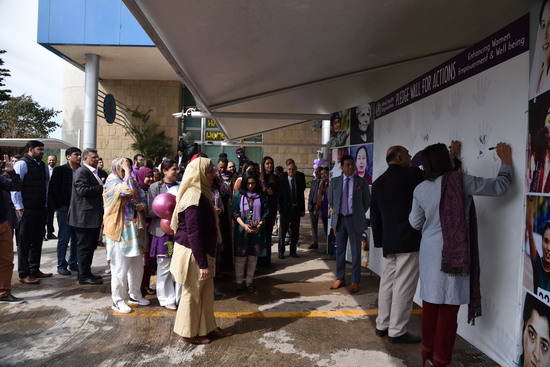
11 March 2020 – International Women’s Day 2020 was commemorated by WHO in Pakistan on 10 March 2020. This year, the event marks the 25th anniversary of the Beijing Declaration and Platform of Action of the Fourth United World Conference on Women: Action for Equality, Development and Peace. The Declaration represented a call for action for governments and stakeholders, including United Nations agencies and civil society on gender equality and women empowerment. Twelve areas of action under the Declaration were identified for women's empowerment constituting key health-related human rights.
In his video message to commemorate the Day Dr Mahipala highlighted the importance of women's empowerment in social, economic, cultural and political spheres of life to achieve health equity and universal health coverage.
Other activities included adding a purple-themed environment to the office, playing the video message of the United Nations Secretary General, exhibiting paintings created by female members of staff and signing a wall to pledge action by all staff members.
Dr Mahipala highlighted the historical importance of International Women’s Day and their fight since 1900 to achieve equality and attain their human rights in his speech in which he said: "Today we are gathered here to strengthen this realization among all of us that women are important in our life and at the workplace. Without their effective contributions and role, we cannot achieve our targets in the field of public health where all of us are striving hard to gain highest attainable standards of health for all in this country. The importance of women's empowerment to achieve gender equality in any society is well recognized by great scholars. When women are empowered through education, have a greater role in contributing to the development of their communities, socialites and nation incredible things happen. Today, we are not only celebrating women's achievements but rather we are here to recognize the importance of empowering women to achieve health equity, gender equality and universal health coverage ultimately.”

11 March 2020 – International Women’s Day 2020 was commemorated by WHO in Pakistan on 10 March 2020. This year, the event marks the 25th anniversary of the Beijing Declaration and Platform of Action of the Fourth United World Conference on Women: Action for Equality, Development and Peace. The Declaration represented a call for action for governments and stakeholders, including United Nations agencies and civil society on gender equality and women empowerment. Twelve areas of action under the Declaration were identified for women's empowerment constituting key health-related human rights.
In his video message to commemorate the Day Dr Mahipala highlighted the importance of women's empowerment in social, economic, cultural and political spheres of life to achieve health equity and universal health coverage.
Other activities included adding a purple-themed environment to the office, playing the video message of the United Nations Secretary General, exhibiting paintings created by female members of staff and signing a wall to pledge action by all staff members.
Dr Mahipala highlighted the historical importance of International Women’s Day and their fight since 1900 to achieve equality and attain their human rights in his speech in which he said: "Today we are gathered here to strengthen this realization among all of us that women are important in our life and at the workplace. Without their effective contributions and role, we cannot achieve our targets in the field of public health where all of us are striving hard to gain highest attainable standards of health for all in this country. The importance of women's empowerment to achieve gender equality in any society is well recognized by great scholars. When women are empowered through education, have a greater role in contributing to the development of their communities, socialites and nation incredible things happen. Today, we are not only celebrating women's achievements but rather we are here to recognize the importance of empowering women to achieve health equity, gender equality and universal health coverage ultimately.”










